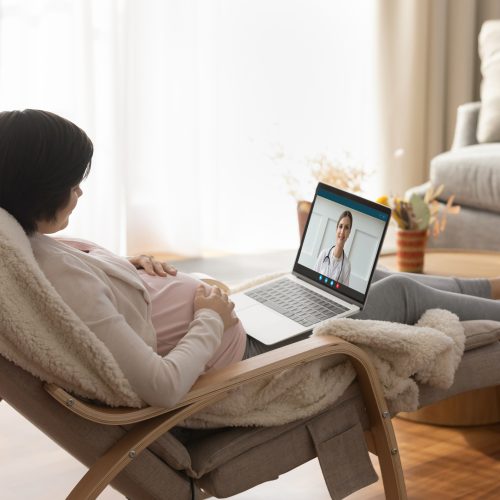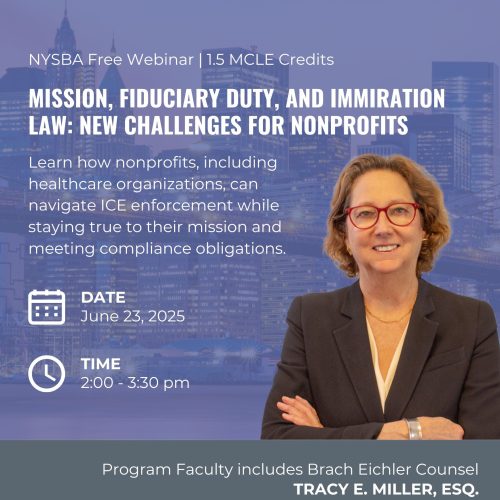Healthcare Law Alert: Governor Murphy Orders Healthcare Workers to Vax or Twice Weekly Test
8/10/2021
On August 6, 2021, Governor Murphy issued Executive Order 252, adding to the numerous prior Executive Orders directed at combating COVID-19. In the preamble to the new Executive Order, Governor Murphy emphasizes the fact that over 5 million people in New Jersey have been vaccinated, but that additional steps are needed to ensure continued receipt by individuals in certain settings over concern to protect against the spread of COVID-19 and to protect at-risk populations in their care. The Governor supports his decision, in part, by virtue of the U.S. Department of Justice’s Office of Legal Counsel opinion issued on July 6 concluding that Section 564 of the Federal Food, Drug, and Cosmetic Act does not prohibit public or private entities from imposing vaccination requirements while vaccinations are only available pursuant to emergency use authorization.
Key Definitions
“Covered Settings” are defined as:
Healthcare facilities including:
- Acute, pediatric, inpatient rehabilitation, and psychiatric hospitals, including specialty hospitals
- Ambulatory surgical centers
- Long-term care facilities
- Intermediate care facilities
- Residential detox, short-term, and long-term residential substance abuse disorder treatment facilities
- Clinic-based settings like ambulatory care, urgent care clinics, dialysis centers, FQHCs, family planning sites, and Opioid Treatment Programs
- Community-based healthcare settings including Program of All-Inclusive Care for the Elderly, pediatric and medical daycare programs, and licensed home health agencies and registered healthcare service firms.
High-risk congregate settings including:
- State and county correctional facilities
- Secure care facilities operated by the Juvenile Justice Commission
- Licensed community residences for individuals with intellectual and developmental disabilities (IDD) and traumatic brain injury (TBI)
- Licensed community residences for adults with mental illness
- Certified day programs for individuals with IDD and TBI.
“Covered Workers” are defined as:
- Employees (both full-time and part-time), contractors, and other individuals working in Covered Settings, including individuals providing operational or custodial services or administrative support.
“Fully Vaccinated” as to a Covered Worker means two weeks or more after the worker received either a single-dose vaccine or the second dose of a two-dose series vaccine. Qualifying vaccines are those currently authorized for emergency use by the FDA or the WHO, or that are approved for use by these organizations. Workers who are not fully vaccinated, or for whom vaccination status is unknown or there is insufficient documentation, are considered unvaccinated under the Executive Order.
Minimum Requirements
- Effective September 7, 2021, Covered Settings must maintain a policy that requires Covered Workers to either provide adequate proof that they have been Fully Vaccinated or submit to COVID-19 testing at minimum one to two times weekly unless and until Fully Vaccinated
- Covered Workers must demonstrate proof they are Fully Vaccinated by presenting any of the following documents that include an administration date for each dose:
- CDC COVID-19 vaccination card (or copy)
- Official record from the NJ Immunization Information System (NJIIS) or other State immunization registry
- Health record on official letterhead signed by a licensed MD/DO, NP, PA, RN, or PharmD
- U.S. Armed Forces military immunization record
- Docket mobile phone application record or any state-specific application that produces a digital health record.
Testing Specifics
- Each unvaccinated Covered Worker must undergo screening testing at minimum one to two times each week
- Where a Covered Setting requires an unvaccinated Covered Worker to submit proof of a COVID-19 test, the Covered Worker may choose either antigen or molecular tests that have EUA by the FDA or is operating per the Laboratory Developed Test requirements by the Centers for Medicare and Medicaid Services
- If the Covered Setting provides on-site access to COVID-19 tests, it may similarly elect to administer or provide access to either an antigen or molecular test
- If the Covered Worker is not working on-site in the Covered Setting during a week where testing would otherwise be required, the worker is not required to submit to testing for that week. However, this requirement does not override or replace any requirement imposed by the Covered Setting regarding:
- diagnostic testing of symptomatic workers, or
- screening testing of vaccinated workers.
- Covered Settings must have a policy for tracking results from testing required under the Executive Order and must report results to local public health departments.
Additional Information
Covered Settings may institute a vaccination or testing policy that includes additional or stricter requirements, including more frequent testing of Covered Workers.
The Executive Order authorizes the Commissioner of the New Jersey Department of Health (DOH) to issue a directive supplementing the requirements of the Executive Order, including but not limited to, requirements for reporting vaccination and testing data to the DOH. We will monitor the issuance of DOH or other guidance relating to the Executive Order.
For additional information or assistance, contact:
Lani M. Dornfeld, CHPC, Member, Healthcare Law, at 973-403-3136 or ldornfeld@bracheichler.com
John D. Fanburg, Managing Member and Chair, Healthcare Law, at 973-403-3107 or jfanburg@bracheichler.com
Joseph M. Gorrell, Member, Healthcare Law, at 973-403-3112 or jgorrell@bracheichler.com
Carol Grelecki, Member, Healthcare Law, at 973-403-3140 or cgrelecki@bracheichler.com
Related Practices: Healthcare Law
Related Attorney: Lani M. Dornfeld, John D. Fanburg, Joseph M. Gorrell, Carol Grelecki












